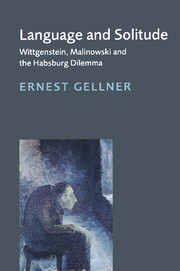Book contents
- Frontmatter
- Contents
- Preface
- Foreword
- Part I The Habsburg dilemma
- 1 Swing alone or swing together
- 2 The rivals
- 3 Genesis of the individualist vision
- 4 The metaphysics of romanticism
- 5 Romanticism and the basis of nationalism
- 6 Individualism and holism in society
- 7 Crisis in Kakania
- 8 Pariah liberalism
- 9 Recapitulation
- Part II Wittgenstein
- Part III Malinowski
- Part IV Influences
- Part V Conclusions
- General bibliography
- Bibliographies of Ernest Gellner's writings on Wittgenstein, Malinowski, and nationalism
- Index
7 - Crisis in Kakania
Published online by Cambridge University Press: 05 March 2010
- Frontmatter
- Contents
- Preface
- Foreword
- Part I The Habsburg dilemma
- 1 Swing alone or swing together
- 2 The rivals
- 3 Genesis of the individualist vision
- 4 The metaphysics of romanticism
- 5 Romanticism and the basis of nationalism
- 6 Individualism and holism in society
- 7 Crisis in Kakania
- 8 Pariah liberalism
- 9 Recapitulation
- Part II Wittgenstein
- Part III Malinowski
- Part IV Influences
- Part V Conclusions
- General bibliography
- Bibliographies of Ernest Gellner's writings on Wittgenstein, Malinowski, and nationalism
- Index
Summary
Kakania was an empire based on a dynasty with its roots deep in the Middle Ages, with a claim to a supreme authority in Central Europe even outside its own family domains, and with very important and intimate links to religion: it was the defender of Europe against the Turkish infidel and, at the same time, the champion of the Counter- Reformation against the heretic. It called itself ‘Apostolic’. Though one language happened to be dominant in Central Europe and was naturally the language of the imperial court, the Empire was not an ethnic empire and did not have very special links to any one ethnic group or language. Rather, there was a certain ethnic division of labour within the Empire, or perhaps one should put this the other way round, and say that the division of labour was accompanied by cultural-linguistic differentiation.
The nineteenth century in effect pulled much of the ideological ground from under the feet of this polity. The Turks were no longer a danger: on the contrary, the danger to peace came only from the squabbling over their territorial inheritance. The weakness, not the strength, of the Turks constituted a danger to European peace. The Counter-Reformation was no longer a rousing cause. The Habsburgs had noticed the superior economic performance of Protestants and were eager to emulate their educational levels (the Weberian thesis about the economic role of Protestantism appeared among bureaucrats before it appeared among professors); in the same way, the Prussians noted the military superiority of free peasants over serfs. So modern ideas, then as now, spread thanks to the apparent success of the societies implementing them.
- Type
- Chapter
- Information
- Language and SolitudeWittgenstein, Malinowski and the Habsburg Dilemma, pp. 30 - 34Publisher: Cambridge University PressPrint publication year: 1998



